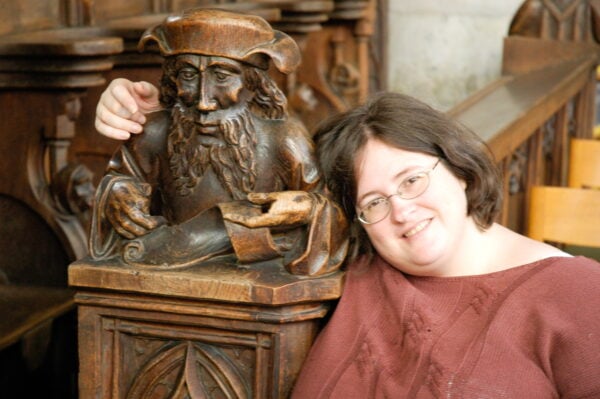It is difficult to convey how much we have lost with the death of Susan Boettcher, a consummate teacher and scholar, a voracious reader and thinker, and a devoted friend. She displayed an exceptional curiosity about the world and an eagerness to interrogate received wisdom, engaging with everything from critical theory to contemporary culture. Driven by a desire to make difficult ideas legible to readers, she taught and wrote with lucidity and passion.

Photo courtesy Henning Jürgens
Susan identified first and foremost as a person of faith. Raised in the Lutheran Church–Missouri Synod in Greenville, Wisconsin, she memorized large parts of the Bible at a young age, a practice that drove her to undertake exegetical readings of opaque texts throughout her life. She did not remain in the Lutheran Church, however. As an undergraduate at Trinity College in San Antonio, she found herself drawn to Judaism, to which she converted while earning her PhD at the University of Wisconsin–Madison. She found great joy in her Jewish communities, particularly a congregation she helped to form in Göttingen, Germany, and later Young Israel of Tampa, Florida, and the Moses Montefiore Congregation of Appleton, Wisconsin. Susan was a skilled leader of prayers and loved singing at the Shabbat or holiday table.
Susan often bore her intellectual abilities with unease, but they were marvelous. She was able to take a concept, a premise, or an idea and carefully turn it over, seeing it from many angles. She loved falling into conceptual rabbit holes and following threads through their many implications. She offered her insights effortlessly and generously, without pretention, often laughing a cheery and disarming chuckle as those observations came to her. Sometimes she paused and bought time with a long “yeah. . .” when she sensed something problematic, dangerous, or contradictory in an idea. Those of us used to sharing our thoughts with Susan learned to read those reactions like signs, because she was such a thorough, candid, and useful critic.
Internationally recognized for her scholarship, she wrote on the formation of German Lutheran confessional culture and the commemorations of Martin Luther in the period after his death. She focused especially on practices of preaching in the confessional age and sought to understand various attempts at Lutheran identity formation, scrutinizing popular literature, memory, and polemic alongside theology and religious sermonizing. In her teaching positions at the University of Missouri–Rolla and the University of Texas at Austin, she published some 17 influential book chapters and journal articles and dozens of book reviews, while also editing reviews for H-German. She received numerous prestigious research fellowships. The University of Texas nevertheless denied her tenure in 2010, at which point she took an untenured position at the University of South Florida.
In the classroom, Susan came alive. She worked tirelessly to improve her effectiveness, seeking vivid and instructive analogies and inspiring students with her enthusiasm and unabashed quirkiness. Gifted with a powerful voice, she sang early modern hymns to her students, performances that produced wild applause. As both a teacher and a friend, Susan had a seemingly endless compassion for others. Particularly because her own path through life was not easy, she was especially sensitive to the issues that wrinkled people’s lives.
Being far away from her family proved increasingly intolerable, so in 2016 she returned to Wisconsin from Tampa to care for her father alongside her brother and his family. There, she taught classes at Marian University of Wisconsin and the state prison on subjects ranging from history, geography, and political science to mathematics, writing, and the nuances of applying for jobs. One of the prison guards later confessed to her that they had initially taken bets on how quickly she (like her predecessors) would quit the job, only to find themselves marveling at her success. “You’re not afraid of anything, are you?” he asked her.
Susan was not afraid, even of death. When she received a diagnosis of a rapidly growing form of liver and gallbladder cancer, she was philosophical. She died within weeks. We have lost a brilliant and singular scholar, a dear friend, and a person who was unapologetically herself.
Carolyn Eastman
Virginia Commonwealth University
Philip Levy
University of South Florida
This work is licensed under a Creative Commons Attribution-NonCommercial-NoDerivatives 4.0 International License. Attribution must provide author name, article title, Perspectives on History, date of publication, and a link to this page. This license applies only to the article, not to text or images used here by permission.